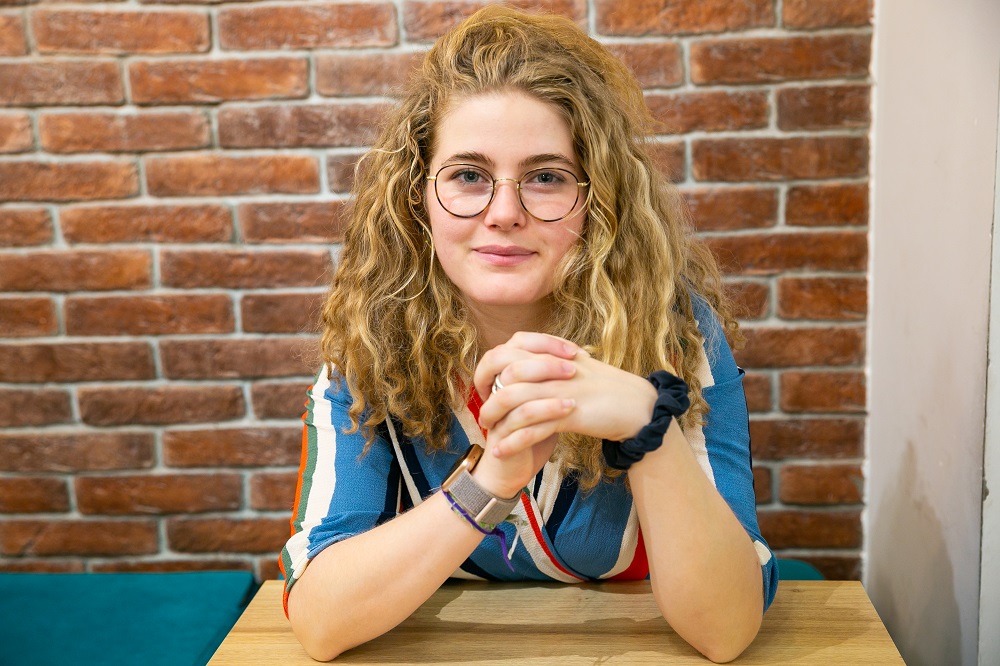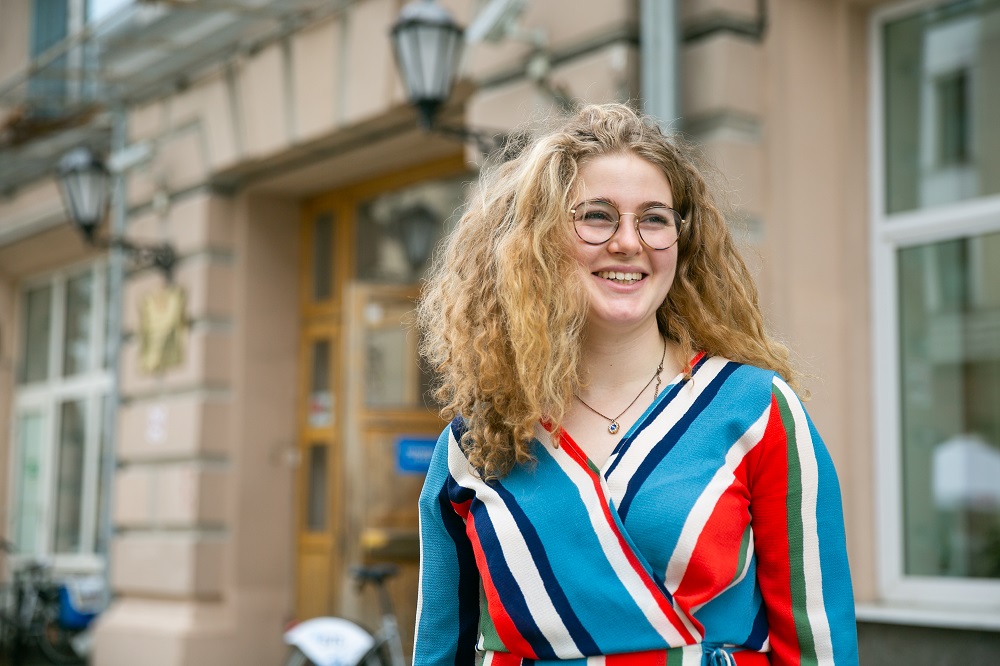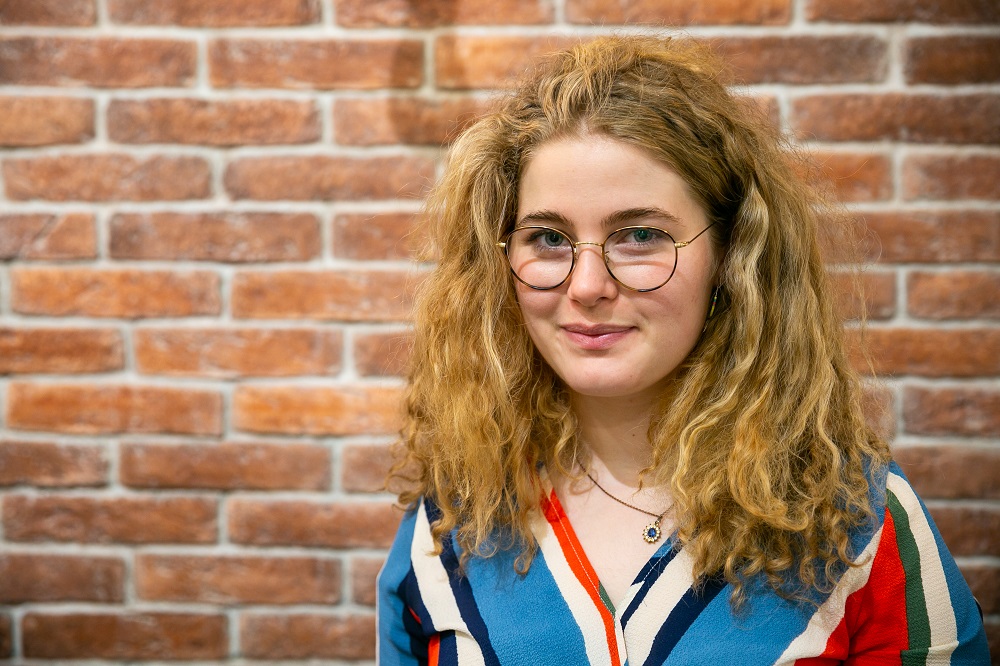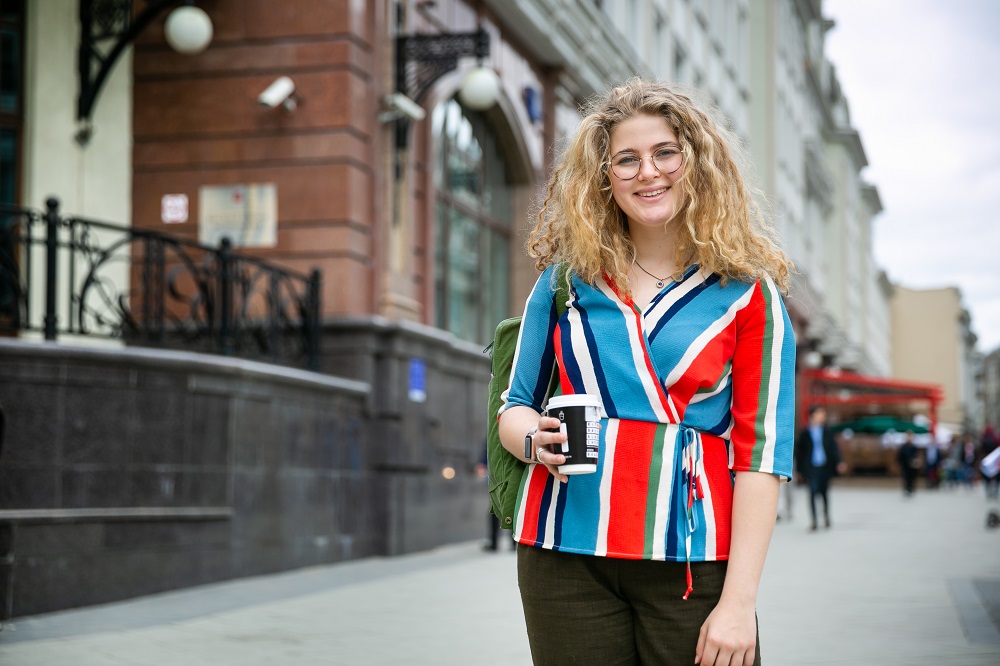In Pursuit of the ŌĆśRussian PerspectiveŌĆÖ

Emilie Flamme is a third-year student at Amherst College (USA), where she is a double major in Architecture Studies and Russian. She just completed a semester at HSE Moscow, during which she took Russian language and content courses. HSE News Service caught up with Emilie to talk about her studies at HSE, her thesis, and her life in Moscow.
On Studying at HSE
I studied in Moscow through a programme hosted by Middlebury College (USA). While I took all my Russian language classes through the Middlebury programme, I had the option of taking additional content courses at HSE. The only stipulation was that the courses had to be conducted entirely in Russian. (Students studying in the Middlebury programme are required to take a ŌĆślanguage pledgeŌĆÖ and speak only Russian.) HSE provided the perfect setup for me: I could take courses in different subjects and not be stuck in just one department.
I took two courses ŌĆō one on Global Cities (an Urban Studies course) and one on Soviet Film History. I did it because I really wanted to challenge myselfŌĆöbefore coming here, I had only taken one year of Russian. So I really was just throwing myself into the vat and hoping that it would turn out okay, which it did. I contacted the professors of the courses and told them that my Russian wasnŌĆÖt great but that I was going to be working on it, and most of the time they were just happy to have someone who wasnŌĆÖt a native Russian come and be interested and do their best in their course.
 Emilie Flamme, third-year student at Amherst College (USA)
Emilie Flamme, third-year student at Amherst College (USA)
┬® Mikhail Dmitriev/ HSE
My favorite course was ŌĆśMegapolises of the WorldŌĆÖ taught by Oksana Zaporozhets. In the course, we did not look at the largest megapolises, such as those in China, India or Japan, but rather at large European cities. It was interesting to learn more about how these big European cities are perceived and to talk about them in Russian. The professor was very knowledgeable and the course was very participatory; the professor really encouraged us all to engage in discussion. At the time I was not confident enough in my Russian to even think about participating, so I did a lot of listening, and it ended up being really informative. I got to hear how the Russian students of the course responded to ideas about what a city means and what common space means. A good amount of the students had recently returned from travelling abroad, so it was very eye-opening to hear about what struck them about the cities they visited, how they perceived leaving the country, and what they said about how these cities matched up with their expectations.
As for my Soviet film history course, we learned about salient themes of Russian film, and then, at the end of the course, we were given a list of four movies that we could pick from and watch, and that was nice, because it was a good way to dissect movies that I had either already seen or had been wanting to see and consider them in the context of visual culture, which is something that IŌĆÖm interested in.
On life in Moscow
Living in Moscow is really awesome and overwhelming at the same time, as any big city is.┬Ā
The city never stops moving, so if you stop moving, itŌĆÖs not going to wait for you. ItŌĆÖs really hard to take a break, because I feel like IŌĆÖm going to miss something
In my free time I go to the gym a lot and I also take a lot of photographs. There is always something remarkable to photograph here. IŌĆÖve enjoyed taking photographs while doing field research for my thesis as well as just walking around Moscow.
On Her Thesis Work
Though one of my majors is architecture, I am more specifically engaged with urban studies, which means I study architecture through the lens of sociology. My thesis project is about Russian apartment buildings built in the 60s under Krushchev (known as piatietazhkior khrushchevski in Russian), which usually have five floors, and, in Moscow, are slated to be torn down and replaced with new residential buildings in the near future.
 Emilie Flamme, third-year student at Amherst College (USA)
Emilie Flamme, third-year student at Amherst College (USA)
┬® Mikhail Dmitriev/ HSE
While at HSE I made a friend who studies architecture, so it was fun that we had a common academic interest and could talk about it. Generally, however, what my time here really helped me with was understanding that khrushchevkihere are not really a topic garnering a lot of attention. The term khrushchevka is also a loaded term with a lot of connotations, so I think I would rather say piatietazhka. In the American Slavic studies context, the word khrushchevki is used more, but in Russia, piatietazhki are what people will actually start talking about.┬Ā┬Ā
When I tell people what IŌĆÖm studying, many people ask, ŌĆśWhy are you studying this? WhatŌĆÖs the point?ŌĆÖ And it has made me reconsider how IŌĆÖm approaching it
Obviously I am approaching the topic from an American Slavic studies perspective, but if I am going to be representing that perspective in my thesis, I need to also understand the topic from the Russian perspective, or, in other words, I need to understand why it is that people in Russia donŌĆÖt think itŌĆÖs something worth talking about. So I think that was the way in which I was most helped in my thesis work here at HSE.
While in Moscow, IŌĆÖve learned that the piatietazhka is really an invisible structure; people donŌĆÖt think about it because itŌĆÖs so ubiquitous. But if the Moscow mayorŌĆÖs renovatsiia (renovation) goes to plan, that whole aesthetic and the culture surrounding itŌĆöthat whole feeling of small-storied MoscowŌĆöis going to disappear for the most part, and thatŌĆÖs really going to change the feel of the city in a lot of ways that I donŌĆÖt think people are really thinking aboutŌĆöitŌĆÖs just not an everyday thought. The city is definitely going to change in terms of vibe, feel, and texture, and that was something that really struck me. Because for me itŌĆÖs like this pressing thing that IŌĆÖm watching happenŌĆöI read the news every day and I follow all the relevant websites, I follow all the telegram channels that send out new info, and I feel like IŌĆÖm on the ground watching this, but the average person just isnŌĆÖt thinking about it.
 Emilie Flamme, third-year student at Amherst College (USA)
Emilie Flamme, third-year student at Amherst College (USA)
┬® Mikhail Dmitriev/ HSE
I also think there is something really fascinating surrounding protest and physical space in Russia, because it is so hard to protest over something that is political or intangible. ┬ĀWhat weŌĆÖre seeing in Ekaterinburg right now (with local residents protesting the construction of a church in place of a park) is a prime example of things IŌĆÖve seen in Petersburg and other places where protests happen around something that can physically be surrounded, something that you can get some ground on, a place where even if people get arrested, thereŌĆÖs something physically there that also exists beyond the protest. I think it will be interesting once more piatietazhki get destroyed and more people become more aware. IŌĆÖm intrigued to see what happens. Will people think of them as something to be saved? Or will they think, ŌĆśOh, thatŌĆÖs OK. TheyŌĆÖre gone now.ŌĆÖ So far, the prevailing reaction I get is, ŌĆśOh well, theyŌĆÖre kind of terrible, arenŌĆÖt they?ŌĆÖ┬Ā
I was fortunate to receive a stipend from Amherst to travel across Russia, so I went from Vladivostok to Irkutsk to Tomsk and Novosibirsk, and I was looking at various raiony (districts). The more money there is, the better the buildings are kept up. One of the most striking examples was Akademgorodok (ŌĆśAcademic CityŌĆÖ) in Novosibirsk where most everything (all the institutes and all the housing) is from the 60s but itŌĆÖs really well maintained. That whole town is so pristine; it looked like it was yesterday. No one there talked about khrushchevki in a pejorative sense. It presented a really interesting contrast to Moscow.
┬Ā
See also:
ŌĆśI Heard Russian People Don't Like to Smile. That's a MisunderstandingŌĆÖ
Sophia Cao is an international student taking a semester at HSE Moscow. She attends courses at the World Economy and International Affairs Faculty and at the┬ĀPublic Policy┬ĀDepartment. Sophia chose to take a semester in Moscow after she joined the┬ĀAIESEC┬Āglobal citizen programme, which aims to empower young people to make a positive impact on society. She told HSE News how one thing led to another.
'Love of Language Draws Student to Moscow'
For the past semester, Alis Endres, an undergraduate student in Business and Economics from Germany, has been studying at HSE in the Faculty of World Economy and International Affairs. As she completes her semester, Alis talks about what brought her to Russia, her experience in Moscow and her plans for the future.
Spend a Semester in Moscow
Applications are being accepted until October 30 for the Semester in Moscow programme, which allows international students to spend either a semester or a full academic year at HSE. The programme is open to all international students who wish to apply to study at HSE on a fee-paying basis.


